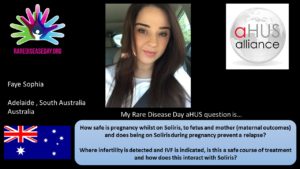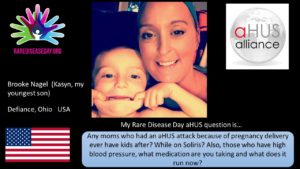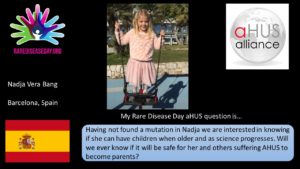Not surprisingly, as it is one of the hottest topics* in the aHUS community, there was a high number of questions about pregnancy in the Rare Disease Day video. About 10% of all aHUS in patients is triggered by pregnancy ,and so it means that just over 1 in 5 women have had aHUS because of pregnancy.
Pregnancy and child birth is something which causes Complement activity to accelerate ,for their duration and beyond ,until things settle back to normal again. During pregnancy , Complement is active because of the foetus, but the placenta provides a defense with Complement control factors in its membrane. Complement tick over normally gradually increases soon after conception to the moment of giving birth.
Then child birth itself is an injurious event and Complement is even more active as foetal cells float through the blood system and haemorrhaging calls in the coagulation systems and clotting becomes ubiquitous.
This happens to all expectant mothers but things remain in control , however in 1 in 25,000 pregnancies a damaging process of thrombotic micro angiopathy (TMA) occurs. In some of these cases it is because the mother is predisposed to aHUS, and lacks the effective complement inhibition factors to keep the system under control , and the pregnancy begins an episode of aHUS. Indeed pregnancy and child birth are known triggering events of aHUS for between 20 to 25% of all female adult cases of aHUS , and data shows most adult cases of aHUS occur in women. So pregnancy and child birth are significant triggers of adult aHUS.
P –aHUS, as aHUS secondary to pregnancy is sometimes described, is a well known, but is an infrequently researched sub-type of aHUS.
The best known researcher on matters P-aHUS is Prof. Fadi Fakouri from France ,whose published article about P-aHUS, , although based on a small amount of data, moved knowledge of the subject on quite a bit.( click here to see it in full)
Among his findings were a number of surprises:
- Most episodes of P-aHUS happen when complement is kicked off because of the transient injurious event of giving birth i.e. post partum.
- Those susceptible to P-aHUS may have had a successful first pregnancy only to face an episode in the second pregnancy.
- It was found that CFH variants which are associated with the most common form of aHUS were not found to be for P-aHUS ,and it was with mutations in the other components C3, CFI, MCP (but not CFB or AFH antibodies) ,that P- aHUS more frequently happened.
- Where the P -aHUS was linked to CFH, the mother had significant variants in CFH, but not the usual ones causing ineffective CFH, but the ones associated with insufficient CFH , and these mothers were more likely to experience miscarriages early in the pregnancy, or pre-eclampsia, rather than postpartum P-aHUS.
Since Fadi’s paper more evidence is emerging about modifying variants which may protect mothers predisposed to aHUS ,and explain several generations of mothers where P-aHUS does not happen. Indeed in a recent study on some Devon families ( see website blog here ) there were no instances where pregnancy triggered an episode of aHUS and several generations of predisposed mothers had no pregnancy associated aHUS. They had a common CFH mutation. Does this happen in other families affected by other mutations?
Even these findings lead to questions that need more answers … How long does that risky period after birth last before normality returns?… Why is second pregnancy more risky, what about the third fourth etc.?
Tila of New Mexico USA asks “ I contracted my disease six and half years ago during delivery process of my beautiful daughter will I ever be able to have another child?”

Are those who know they are predisposed to aHUS e.g. through a common CFH variant, being properly advised when if told not to get pregnant or go through with it if they do ? Throw in also questions about the likelihood of passing on significant predisposing and modifying variants and the decisions become complex .
Hamlet of Germany raises a question about knowing whether the unborn baby has inherited a predisposition to aHUS “Is there a kind of test which is done during pregnancy to find out if the baby has aHUS? ”

The simple answer to that is “yes” and it is being done. The question then becomes one of “What to do with the knowledge that brings?”
What are the risks facing other aHUS mothers , can some expect event free pregnancies , and can eculizumab be used tactically to offset risk if need be ?
Questions by Faye of Adelaide South Australia ” How safe is pregnancy whilst on eculizumab to foetus and mother ( maternal outcomes ) and does being on eculizumab prevent a relapse”

Also anonymous of Canada asks ” Is eculizumab safe to take during pregnancy?” As does Brooke of Defiance Ohio USA ” Any moms who had aHUS because of pregnancy delivery ever have kids after while on eculizumab?”

Most of the published research about the safety of eculizumab in pregnancy comes from studies of PNH patients; but a small number of aHUS case studies are beginning to appear. One case study ( click here ), which was the first published case about using eculizumab in pregnancy of an aHUS patient , reports a successful outcome for one patient.
A specific agenda is developing for aHUS mothers, and with eculizumab there are likely to be more aHUS mothers, as today’s aHUS children grow up and face parenthood themselves with questions of their own needing answers.
A question for Nadja of Barcelona “ Having not found a mutation in Nadja we are interested in knowing if she can have children when older and as science progresses . Will we ever know if it will be safe for her and others suffering aHUS to become parents?”

.
A second question by Faye of Adelaide introduces a further dimension to the aHUS pregancy research agenda ” When infertility is detected and IVF is indicated is there a safe course of treatment and how does that interact with eculizumab?” Although a rare occurrence again PNH patients studies provide some answers ( see patient 6 in this PNH/Pregnancy study here ) .
Such answers must come from research, and with as much data as can be gathered as possible , and then adequate screening must be carried if families are to get the best possible counselling advice to make decisions and informed choices about family planning.
The aHUS Registry SAB has included a study of pregnancy in its research programme as a response to the alliance’s priorities for research list, as discussed in the Orphanet Journal of Rare Diseases article
An innovative and collaborative partnership between patients with rare disease and industry-supported registries: the Global aHUS Registry ( see copy here ).
One of the few ,if not the only, aHUS videos devoted to the subject of the pregnancy trigger, features Dr Edwin Wong of the University of Newcastle upon Tyne. Click here to see ( it is about 15 minutes viewing time excluding questions) .
So many questions whose answers produce even more questions. aHUS patients are contributing to this important aspect of the aHUS research agenda.
…………………..
* click here to see a previous alliance blog on the topic of pregnancy
Looking for research links regarding aHUS & pregnancy?
Click HERE for our aHUS Alliance overview with multiple resources.

